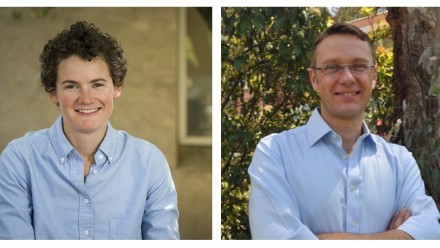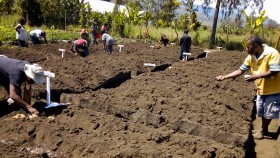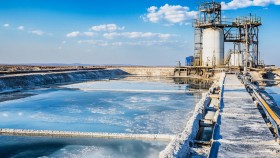Enhancing your research profile and networks
The interdisciplinary ANU Climate Change and Energy Change Institutes include world-leading researchers from throughout the university, tackling some of the world's biggest modern day issues. Membership is open to any ANU researcher whose work touches on climate or energy.
Two of the Institute's members discuss how the Institutes help them in their work.
The Fenner School of Environment and Society's Dr Sophie Lewis, spends her days researching how current extreme weather events are changing and how they might change in the future with further global warming. Meanwhile, over at The Crawford School of Public Policy, Associate Professor Llewelyn Hughes has been investigating how public policies affect, and are affected by, energy markets around the world.
Sophie is a member of the ANU Climate Change Institute (CCI) and Llewelyn is an Executive Member of the ANU Energy Change Institute (ECI). Both researchers make use of their cross-university connections to push their research forward.
This multidisciplinary approach saw ECI become one of three finalists in the ANU Grand Challenges scheme where Llewelyn was one of the multidisciplinary team that delivered the 'Zero-Carbon Energy for the Asia-Pacific' pitch in October.
Llewelyn says he was drawn to the ECI based on its multidisciplinary approach, something he learned from his time as a doctoral student at the Massachusetts Institute of Technology.
"You really need a combination of skills to give you all the answers," he said.
"The ECI provides me with an opportunity to learn from my colleagues, and to share my knowledge with them. And besides, I like hanging out with technologists."
Sophie says unless an institute like the CCI exists so that academics from across the University can work together, it's hard to know that other academics may be working on the same topic from a different disciplinary perspective.
"This is the particularly the case for a problem as big as climate change, where climate related issues encompass everything from physics to sociology," Sophie said.
"I've had a chance to interact with other researchers via the CCI that I would never have had otherwise."
The ECI plays a key partnership role with the ACT Government's Renewables Innovations Hub, a space designed specifically for the renewable energy and clean-tech industry, located within Canberra's CBD right next to ANU, while the CCI plays a significant role on commentary in relation to the ongoing debate around climate.
"In the current political climate, there is even more of a role in terms of disseminating accurate evidence-based information," Sophie said.
"The CCI does a really good job of being in touch with researchers and getting them to promote their expertise in the media and various other forums.
"They've also really helped me in terms of developing and promoting my own work, particularly with my recent book coming out."
A lot of research units within other universities focus on specific aspects of climate change such as the underlying physical mechanisms and changes, she says.
"But both the ANU Institutes are different - their strength is in the breadth of research they cover, rather than focusing on one area specifically."
Llewelyn's advice to those considering joining one of the two Institutes is to "Get stuck in. Step outside your discipline's boundaries and interact in other communities."
The Institutes are virtual organisations with several hundred members each. They're open to anyone employed at ANU involved in climate or energy research (staff and PhD students). Both Institutes are keen to help early career researchers, and particularly early career female researchers.
To find out more or join up as a member, head to the Energy Change Institute and Climate Change Institute websites.











